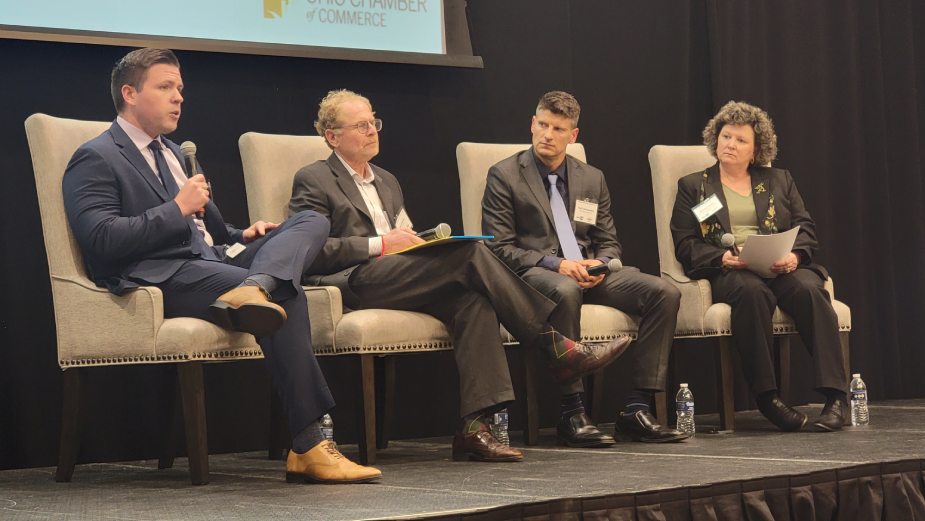Ohio Organizations Bridge Literacy Gap
YOUNGSTOWN, Ohio – Thirty-nine percent of kindergartners in Trumbull County are behind in their reading skills, says the Ohio Department of Education.
That may seem insignificant because of their young age but it’s not, says Laureen Atkins. Atkins is vice president of strategic initiatives at the Literacy Cooperative.
“If [children] are below grade level in kindergarten, it gives them a harder time to catch up to grade level by third grade,” she says. “When you are in kindergarten to grade three, your focus is on learning to read. After grade three, you use reading to learn. The focus goes away from learning how to read to using those reading skills to learn all of the different things related to it.”
The Cleveland-based Literacy Cooperative is a nonprofit intermediary organization that brings foundations and organizations together to advance literacy.
While reading, math and digital literacy are the basic building blocks, Atkins says there are other branches of literacy. These include health and financial literacy.
“If you have ever gone to the doctor and got the readout at the end of your session, it tells you a lot of different things they are guiding you to do,” Atkins says. “For the most part, individuals are going to struggle with that. Even looking at medication that they’re taking, it could be as simple as when they are supposed to take the medication.”
Atkins says health literacy can affect the paperwork for certain medications and it becomes an issue for those barely literate.
“Also, it’s that financial literacy piece of it,” she says. “Most of the individuals are going to be at a lower income level because their access to the jobs that have higher wages is limited. They aren’t able to do multifunction-type positions because they become difficult for them.”
Atkins says many people in lower-paying jobs lack bank accounts, forcing them to pay fees when they cash their paychecks.
“They access payday lending,” she says. “They access banking services within a grocery store or a retail store to cash checks and that creates a fee every single time. Someone that is unbanked is spending almost $200 a year just in fees.
“It’s intergenerational,” she says. “A mother’s reading skills are the greatest determinant of her child’s future academic success.”
Children with parents barely literate or illiterate are already at a disadvantage.
“The easiest way to think about it is, the parent is the child’s first teacher,” Atkins says. “So those critical years of 0 to 5 for a child – that’s when the parent is working with them and reading to them, showing them what types of colors there are, what numbers are, what types of shapes there are and starting to recite words.”
This has a “spiraling effect on children,” she says.
One resource that the Literacy Cooperative promotes is the Ohio Governors Imagination Library, a partner of Dolly Parton’s Imagination Library. This program ships age-appropriate books and parallel activities to the homes of registered children, from birth to age 5.
“Reading is one of the single greatest things caregivers can do with children to prepare them for a successful future and the earlier the better,” says Catherine Sulecki, marketing and communications director of the Ohio Governor’s Imagination Library. “Brain science shows that a child’s brain is already 80% developed by the time he or she turns three years old.”
Because literacy skills begin at birth, the group works with hospitals across the state to help children get enrolled before they leave the hospital. Those enrolled at birth, she says, will be sent 60 books by the time they enter kindergarten.
“These books are helping children develop a basic understanding and knowledge of books – things like reading from front to back, or the understanding that print has meaning,” Sulecki says. “Not only are these books giving children fundamental skills, but the books are also sparking imagination, creativity and curiosity.”
Children who enter kindergarten with a disadvantage in literacy face worsening consequences over time, Sulecki says. The first book all of the children receive from the free program is “The Little Engine That Could” by Watty Piper. It offers parents tips to teach their children words and identify what is in the pictures, Sulecki says.
As children grow older, Atkins says it becomes harder for them to learn and retain those key literacy skills. This is why the Literacy Cooperative also promotes occupational training linked with literacy and numeracy education.
“They will retain reading and math quicker and retain it longer when they see how it is connected to the occupation they are interested in,” Atkins says. “We call that conceptualized learning, which is actually taking math, reading and writing and doing lessons that are related to an occupation and blending that in with the training.”
The domino effect of poor literacy affects the entire community, Atkins says. It creates a greater need for use of government program and worker shortages.
One thing Atkins says she would like to tell the community is that refreshing literacy and numeracy skills shouldn’t be embarrassing and is often needed, no matter someone’s level.
“It should be as common as anything else in the community,” she says. “If we’re going to try to build the skills of our workforce, let us make sure we give them the opportunity to refresh their literacy and numeracy skills as well. That not only helps them get into better job. But it helps them become better teachers for their kids.”
More information, go to LiteracyCooperative.org/.
Pictured at top: Children behind in reading skills rarely catch up.
Copyright 2024 The Business Journal, Youngstown, Ohio.



